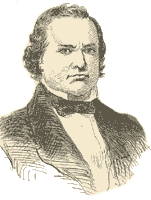Stephen Arnold Douglas was born in Brandon, Vermont. He received a basic education, became employed in farm work and, briefly, teaching. At age 20 he moved to Illinois, his home for the remainder of his life.
 Douglas began practicing law in 1834, followed quickly by political ventures, including the office of Illinois attorney general, two years in the state legislature and an unsuccessful run for Congress. In 1840, Douglas became Illinois secretary of state, then served as a judge on the state supreme court from 1841 to 1843. He was elected to the House of Representatives in 1843 and to the Senate in 1847.
Known as the “Little Giant” for his diminutive size but towering will, Douglas played a major role in most of the major public issues of his day. He was an ardent expansionist, advocating the annexation of Cuba and the entirety of the Oregon Territory. He was a supporter of the Mexican War. In the Senate Douglas chaired the influential Committee on Territories, which guided territories to statehood. With Henry Clay he drafted the component bills of the Compromise of 1850. Douglas coined the term “Popular Sovereignty” and urged that doctrine's acceptance as a solution to the problems of the extension of slavery in the territories. He also was the prime force behind the Kansas-Nebraska Act in 1854.
Douglas was nominated for president by the Democratic Party in 1852 and 1856. In the latter campaign, Douglas threw his support to James Buchanan, the eventual winner. In one of the most dramatic and principled moves of his career, Douglas broke with the president over his support of the proslavery minority in Kansas. In 1858 he sought reelection to the Senate and engaged Abraham Lincoln in the historic Lincoln-Douglas Debates. Douglas won the election, but Lincoln emerged as a national figure. In 1860 Douglas was unable to secure the necessary two-thirds vote for nomination in the Democratic convention, but later accepted nomination from a rump convention of Northern Democrats.
Douglas worked tirelessly in search of a compromise that might avert war. When the conflict finally came, he ardently supported Lincoln. On a trip to the Midwest and Border States, Douglas contracted typhus and died later.
Stephen Douglas was truly one of the great political figures of his era, one of the few with a national vision, but his reputation has suffered in comparison with Lincoln.
Douglas began practicing law in 1834, followed quickly by political ventures, including the office of Illinois attorney general, two years in the state legislature and an unsuccessful run for Congress. In 1840, Douglas became Illinois secretary of state, then served as a judge on the state supreme court from 1841 to 1843. He was elected to the House of Representatives in 1843 and to the Senate in 1847.
Known as the “Little Giant” for his diminutive size but towering will, Douglas played a major role in most of the major public issues of his day. He was an ardent expansionist, advocating the annexation of Cuba and the entirety of the Oregon Territory. He was a supporter of the Mexican War. In the Senate Douglas chaired the influential Committee on Territories, which guided territories to statehood. With Henry Clay he drafted the component bills of the Compromise of 1850. Douglas coined the term “Popular Sovereignty” and urged that doctrine's acceptance as a solution to the problems of the extension of slavery in the territories. He also was the prime force behind the Kansas-Nebraska Act in 1854.
Douglas was nominated for president by the Democratic Party in 1852 and 1856. In the latter campaign, Douglas threw his support to James Buchanan, the eventual winner. In one of the most dramatic and principled moves of his career, Douglas broke with the president over his support of the proslavery minority in Kansas. In 1858 he sought reelection to the Senate and engaged Abraham Lincoln in the historic Lincoln-Douglas Debates. Douglas won the election, but Lincoln emerged as a national figure. In 1860 Douglas was unable to secure the necessary two-thirds vote for nomination in the Democratic convention, but later accepted nomination from a rump convention of Northern Democrats.
Douglas worked tirelessly in search of a compromise that might avert war. When the conflict finally came, he ardently supported Lincoln. On a trip to the Midwest and Border States, Douglas contracted typhus and died later.
Stephen Douglas was truly one of the great political figures of his era, one of the few with a national vision, but his reputation has suffered in comparison with Lincoln.